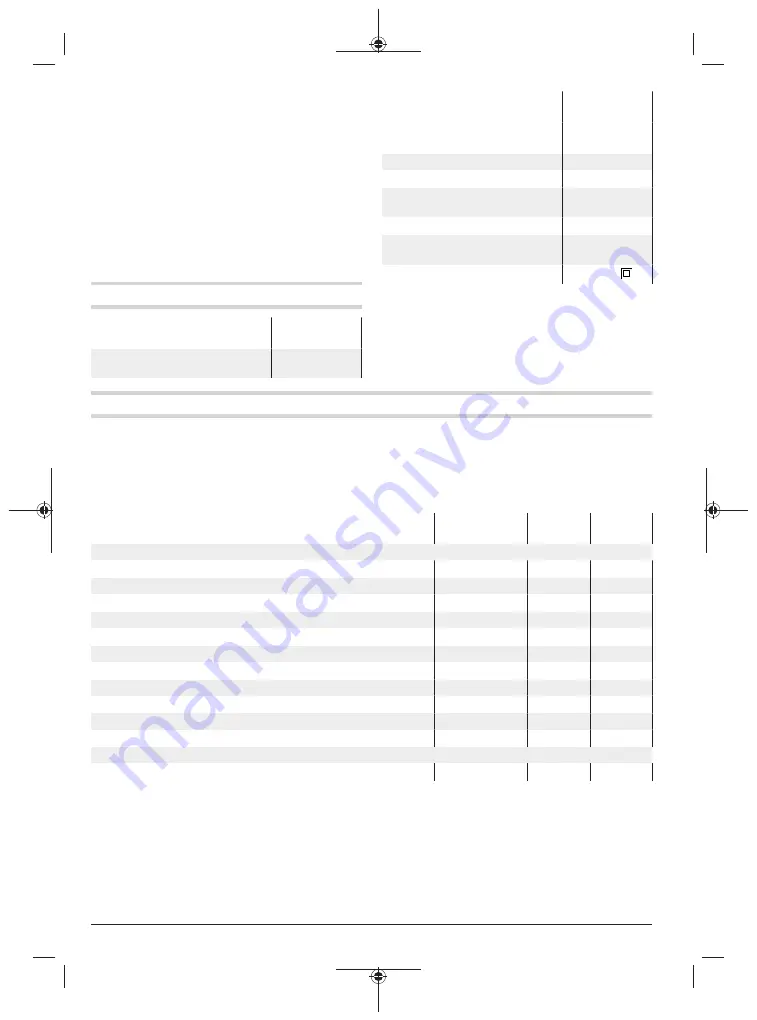
(7)
Complete dust box (filter system for fine
dust)
(8)
Sanding pad
(9)
Handle (insulated gripping surface)
(10)
Sanding sheet
A)
(11)
Screw for sanding pad
(12)
Extraction outlet
(13)
Extraction hose
A)
A)
Accessories shown or described are not included
with the product as standard. You can find the com-
plete selection of accessories in our accessories
range.
Technical Data
English
Random orbit sanders
BROS-125/
150 AVE
Article number
152625
180723
Random orbit sanders
BROS-125/
150 AVE
Orbital stroke rate
preselection
●
Rated power input
W
400
No-load speed n
0
min
-1
5500–12000
No-load orbital stroke
rate
min
-1
11000–24000
Orbit diameter
mm
4
Weight according to
EPTA-Procedure 01:2014
kg
2.4
Protection class
/ II
The specifications apply to a rated voltage [U] of 230 V.
These specifications may vary at different voltages and in
country-specific models.
Noise/vibration information
English
Noise emission values determined according to
EN 62841-2-4
.
Typically, the A-weighted noise level of the power tool is:
82
dB(A); sound power level
93
dB(A). Uncer-
tainty K =
1.5
dB.
Wear hearing protection
Total vibration values a
h
(triax vector sum) and uncertainty K determined according to
EN 62841-2-4
:
Application
Orbital stroke
rate level
Pressing force
[N]
a
h
[m/s
2
]
K
[m/s
2
]
Measurement according to
EN 62841-2-4
for sanding tools (using sanding paper with 180 grit):
Sanding with maximum removal rate
6
50
2.5
1.5
Intermediate lacquer sanding
5–6
10–20
2.5
1.5
Fine sanding of softwood
5–6
0–10
2.5
1.5
Fine sanding of hardwood
5–6
10–20
2.5
1.5
Fine sanding of veneer
5–6
10–20
2.5
1.5
Sanding down old paint and varnish
5–6
30–40
2.5
1.5
Sanding metals
5–6
30–40
2.5
1.5
Sanding bodyfiller
5–6
20–30
2.5
1.5
Sanding wooden and veneer edges
3–4
0–10
5.5
1.5
Intermediate lacquer sanding on edges
3–4
0–10
5.5
1.5
Sanding thermoplastic synthetic materials
1–2
0–10
7.5
1.5
Measurement according to EN 62841-2-4 for polishers (with lambswool bonnet):
Polishing
1
0–10
3.5
2.5
The vibration level and noise emission value given
in these instructions have been measured in ac-
cordance with a standardised measuring proced-
ure and may be used to compare power tools.
They may also be used for a preliminary estima-
tion of vibration and noise emissions.
The stated vibration level and noise emission
value represent the main applications of the
power tool. However, if the power tool is used for
other applications, with different application tools
or is poorly maintained, the vibration level and
noise emission value may differ. This may signific-
antly increase the vibration and noise emissions
over the total working period.
To estimate vibration and noise emissions accur-
ately, the times when the tool is switched off or
14 |
English
1 609 92A 4DE • 14.1.19















































